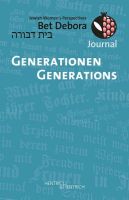 Judaism is founded on the passing on of traditions, knowledge and history from generation to generation. Authors from Eastern and Western Europe show the myriad of ways in which women have contributed to ensuring Jewish continuity, preserving knowledge that had been handed down to them, taking a critical look at traditions and opening new perspectives for future generations.
Judaism is founded on the passing on of traditions, knowledge and history from generation to generation. Authors from Eastern and Western Europe show the myriad of ways in which women have contributed to ensuring Jewish continuity, preserving knowledge that had been handed down to them, taking a critical look at traditions and opening new perspectives for future generations.
Family: Marianna Salzmann and Ruth Fruchtman talk about the women in their respective families, who have very little in comon with the “selfless Jewish mother“stereotype. Miriam Widman questions the role she plays as a mother in the Jewish upbringing of her children.
New Beginning: Rita Kashner describes how Project Kesher motivates mothers and daughters in CIS countries to embrace their heritage and become active in structuring and organizing Jewish ways of life. Louise Hecht profiles Fanny Neuda (1819-1894), the first woman who composed a German-language prayer book for Jewish women. For centuries, women had been exlcluded from studying the Talmud. Valérie Rhein speaks of a new generation of young orthodox women who are succesfully studying to become rabbis.
Role models: Marion Böker pays hommage to the women’s rights activist Bertha Pappenheim (1859-1936) and her commitment to her work as a modern lobbyist for the victims of trafficking in women and girls. Katalin Pécsi-Pollner and Tania Reytan introduce Jewish resistance fighters from Hungary and Bulgaria.
Identity: Leah Davcheva and Richard Fay depict the meaning of Ladino for Bulgarian Jews. By exploring Turkish-Sephardic cuisine, Sibel Cuniman Pinto illustrates that culinary traditions too can contribute to a sense and understanding of identity. Eszter B. Gantner illuminates how the conception of a Jewish self in Hungary has been shaped by different historical experiences and realities throughout different generations.
Jewishness: Eszter Susán and Anna Makówka-Kwapisiewicz elaborate the ways in which young people in Budapest and Krakow are reflecting on their Jewish heritage and helping Jewish life to flourish once more. Manja Pach chronicles how a liberal Jewish community in the Netherlands reclaimed ownership of a disused village synagogue. While the women here had once been confined to the gallery, the synagogue now employs a female rabbi and cantor
Language: German, English
148 pages, softcover with (fold-in) flaps
46 illustrations
ISBN: 978-3-95565-049-0
15.00 € / 27.90 CHF
